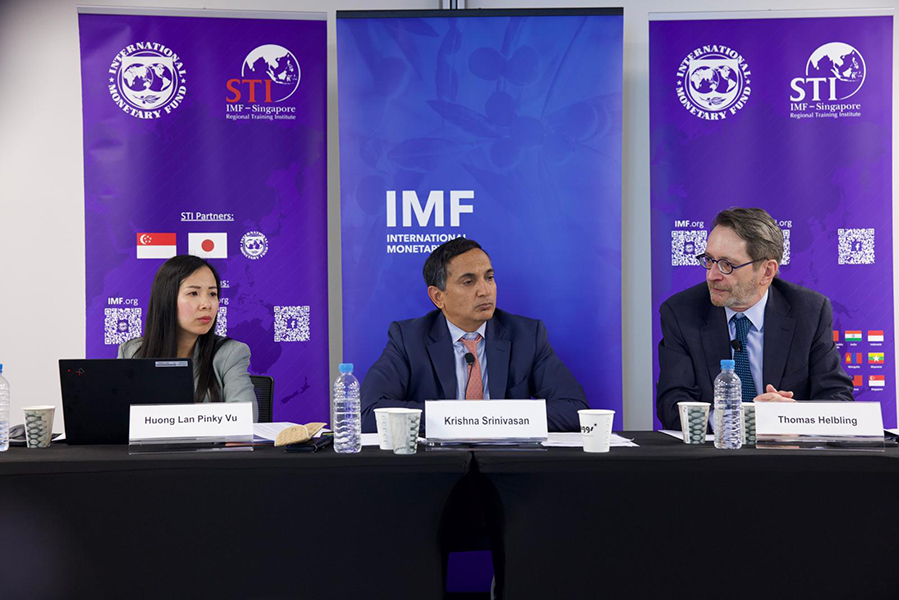IMF calls again for “greater exchange rate flexibility” to address external shocks
Regional Economic Outlook lessens growth projection on tighter policy stance

Published :
Updated :

The International Monetary Fund (IMF) on Tuesday again advocated for Bangladesh to go for greater exchange rate flexibility to overcome the forex reserve linked problems.
“It’s important that the next stage of the reform agenda is to allow greater exchange rate flexibility, which would help you address the problems in the external sector and the financial account,” said Krishna Srinivasan, the IMF's director for the Asia and Pacific.
He said, “And once you do that, you’ll see a greater sense of stability coming back in the external accounts, which, in tandem with improvements the government is making on the fiscal side, should see more sustained recovery from the crisis that every country has faced in the region because of multiple shocks and the Covid pandemic.”
Mr Srinivasan had been briefing newsmen in Singapore on the eve of releasing IMF’s Regional Economic Outlook for Asia and Pacific.
He said Bangladesh was a country that proactively showed the IMF for support for its homegrown programmes, which have two components--one is macroeconomic stability, and the other is addressing the longer-term structural issues related to climate change.
“On macro performance, so far there have been significant improvements,” he said.
The growth for Bangladesh in 2024, according to IMF predictions, will be 5.7 per cent and in 2025 it can be 6.6 per cent, he said.
Mr Srinivasan said there have been improvements in the monetary policy framework and also in the fiscal performance.
“I think where Bangladesh was struggling a little bit was the fact that while the current account was adjusting well, partly because there were restraints on imports and so on,” he said.
“The financial account wasn't doing very well. So, in some sense, you could see the bleeding of reserves and taka coming under pressure,” noted Srinivasan.
In the Regional Economic Outlook report, the IMF said that growth in Bangladesh is projected to slow mildly to 5.7 per cent this year (from 6.0 per cent in 2023) reflecting a tighter policy stance.
On the regional economic situation, Mr Srinivasan said, the Asia-Pacific region is marked by both resilient growth and rapid disinflation.
The growth is better than previously projected but will slow from 5.0 per cent in 2023 to 4.5 per cent in 2024. The region remains inherently dynamic and accounts for about 60 per cent of global growth, he said.
He said drivers of growth are as heterogeneous as the region, straddling from resilient domestic consumption in most ASEAN countries, to strong public investment in China and, most notably, India, to a sharp uptick in tourism in the Pacific Island countries.
Mr Srinivasan further said that disinflation has advanced throughout the region, although at different speeds—in some cases, it remains above target, like in Australia and New Zealand while in others, it is at or close to central bank targets, like in Japan and in some cases, there are deflation risks, like in China and Thailand.
“China is a source of both upside and downside risks. Policies aimed at addressing stresses in the property sector and boosting domestic demand will both help China and the region. But sectoral policies contributing to excess capacity will hurt China and the region,” he said.
“Geoeconomic fragmentation remains a significant risk,” he said, adding that “Asian central banks should continue to focus firmly on domestic price stability and avoid making policy decisions overly dependent on anticipated interest rate moves by the Federal Reserve.”
He suggested that Asian countries should continue to allow the exchange rate to act as a buffer against shocks while advancing fiscal consolidation, which is an urgent priority both to lessen the burden of higher debt levels and interest costs and to rebuild the fiscal space needed to address medium-term structural challenges.
“Supervisors should continue to vigilantly monitor the buildup of risks associated with the pass-through of tighter monetary policies to corporate and household balance sheets,” he said.
He cautioned that industrial policies, which have been on the rise in Asia and the Pacific region and globally, can lead to unintended consequences, like trade distortions, which risk reinforcing fragmentation.
syful-islam@outlook.com


 For all latest news, follow The Financial Express Google News channel.
For all latest news, follow The Financial Express Google News channel.